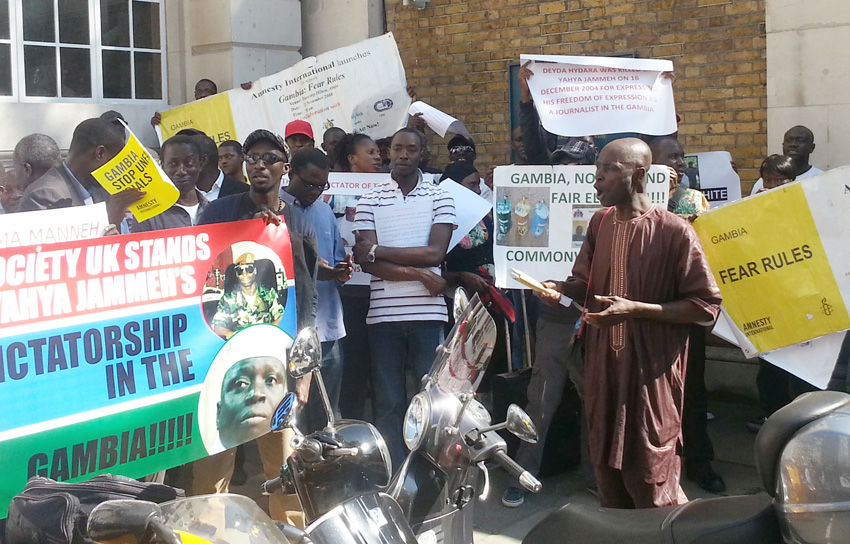CHARGES against two journalists detained after they applied for permission to hold a peaceful protest over the executions of nine death row inmates must be dropped by the Gambian authorities, Amnesty International said last Friday.
Baboucarr Ceesay, the First Vice President of The Gambia Press Union (GPU) and Abubacarr Saidykhan, an independent freelance journalist, were charged on 10 September with conspiracy to commit a felony.
The two journalists were released later that day and were told to report to police headquarters on Monday, 17 September.
Sources told Amnesty that the pair delivered a letter to the Gambian Police on Thursday 6 September to request a permit to hold a peaceful public demonstration the following day.
But they were arrested later that evening after they went to a police station, at the request of police officials. They were taken to their homes last Friday where police conducted searches.
They were then held in detention without charge over the weekend – exceeding the maximum limit of 72 hours of detention without charge specified in the Gambian Constitution.
Amnesty International’s West Africa Researcher Lisa Sherman-Nikolaus said: ‘This is yet another example of the Gambian government’s total intolerance of criticism.
‘The Gambian authorities must immediately and unconditionally drop all charges against Babourcarr Ceesay and Abubacarr Saidykhan.
‘They have been targeted solely because they have tried to exercise their right to peaceful freedom of expression and assembly.
‘The Gambian authorities must protect those who exercise their rights to freedom of expression and assembly, and ensure that journalists and human rights activists can carry out their work without interference from the government.’
Amnesty noted:
1. The letter which led to the arrest of the journalists was addressed to the Inspector General of Police and entitled: ‘Application for a permit to hold a peaceful demonstration.’
The letter states: ‘We will uphold our principle of no violence throughout the process (of the demonstration). We want to demonstrate because we fear that if we sit and watch there might be another execution.’
2. Attempts by their lawyer and the Gambian Press Union to visit them in detention were blocked.
3. Amnesty repeatedly tried to confirm details of the journalists’ detention with the Gambian police, but the police did not provide any information.
4. Amnesty International and 66 other international human rights and West African civil society organisations have expressed outrage at the executions that took place on 23 August, which were carried out in secret and without notification to the individuals executed or their families.
An Amnesty Action alert ‘Stop the execution spree in Gambia’ quoted President Jammeh as saying on August 19: ‘By the middle of next month all the death sentences would have been carried out to the letter.’
Amnesty quoted the wife of a death row prisoner in Gambia: ‘These past few days have been something like a nightmare. We don’t know what’s happening – who is dead and who is alive. And we don’t know who will be next.’
Amnesty said: ‘On Thursday 23 August eight men and one woman on death row in Gambia were dragged from their cells without warning and shot by firing squad.
‘They died without being able to say good bye to their families, and they were not warned that they were going to be killed.
‘They were the first people to be executed in the country for 27 years. Their deaths confirm that President Yahya Jammeh was not bluffing when he threatened to kill all death row inmates by the middle of September.
‘Now, at least 38 others are at serious risk of meeting the same end.
‘In Gambia this cruel, inhuman and degrading punishment is being used on those convicted of political charges.
‘Many inmates claim to have had confessions tortured out of them and we are concerned that those being executed didn’t receive fair trials in the first place.’
On Sunday, the Gambian opposition ocalled on President Jammeh to do more than suspend the executions of prisoners on death row, urging him to commute their sentences to life in jail.
Jammeh announced last Friday that he was imposing a moratorium on executions, after coming under intense criticism for resuming capital punishment with the execution by firing squad of nine convicts last month.
United Democratic Party leader Ousainou Darboe, who was defeated by Jammeh in an election last year, said on Sunday: ‘His decision to put a halt to the executions was as a result of serious international pressure and it was right that the government has responded in a mature way to the outcry.
‘I think he should go further than this and commute the sentences of all those on death row to life imprisonment.’
Jammeh said last Friday: ‘It is hereby made clear that it is only a moratorium on executions and what happens next will be dictated by either a declining violent crime rate in which case the moratorium will be indefinite or an increase in the violent crime rate in which case the moratorium will be lifted automatically.’
The Gambian president’s office said international pressure had played a part in the decision to suspend executions, including from Ivory Coast, Mauritania and Senegal – which surrounds Gambia except for a strip of Atlantic coastline.
Two Senegalese were among the nine executed prisoners.
